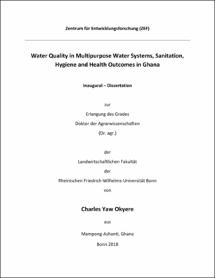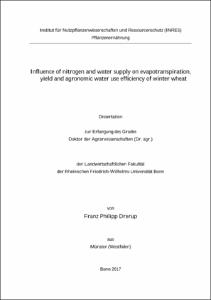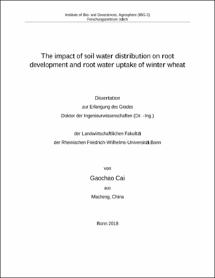Okyere, Charles Yaw: Water Quality in Multipurpose Water Systems, Sanitation, Hygiene and Health Outcomes in Ghana. - Bonn, 2018. - Dissertation, Rheinische Friedrich-Wilhelms-Universität Bonn.
Online-Ausgabe in bonndoc: https://nbn-resolving.org/urn:nbn:de:hbz:5n-48542
Online-Ausgabe in bonndoc: https://nbn-resolving.org/urn:nbn:de:hbz:5n-48542
@phdthesis{handle:20.500.11811/7321,
urn: https://nbn-resolving.org/urn:nbn:de:hbz:5n-48542,
author = {{Charles Yaw Okyere}},
title = {Water Quality in Multipurpose Water Systems, Sanitation, Hygiene and Health Outcomes in Ghana},
school = {Rheinische Friedrich-Wilhelms-Universität Bonn},
year = 2018,
month = mar,
note = {This thesis examines the interlinkages between water quality, water use, sanitation and hygiene practices, other household characteristics and health outcomes in the context of multipurpose water systems in Ghana. Household-level data newly collected for this research between 2014 and 2015 are used. In this study context, multipurpose water system is defined loosely as location or presence of water resources being used for more than one economic or domestic activity. To elicit causal relationships and impacts, the study uses both econometric analysis and a cluster randomized evaluation design. We find evidence that participation in irrigated agriculture and household head's education to secondary school level and beyond have positive and significant effects on both short run and long run nutritional status of children under eight years of age while current household per monthly income has mixed effects on child health and nutrition status. Disposal of liquid waste on the compound of the dwelling increases diarrhea risk and also leads to a reduction in nutritional status. Open defecation increases diarrhea risk. However, the effects are not uniform as they depend on the choice of child health and nutrition indicators.
Secondly, the thesis evaluates the impacts of a household water quality testing and information experiment on water behaviors, using a randomized control trial. In 2014, a group of 512 households relying on unimproved water, sanitation and hygiene practices in the Greater Accra region of Ghana were randomly selected to participate in the intervention on water quality self-testing and to receive water quality improvement messages (information). The results suggest that the household water quality testing and information experiment increase the choice of improved water sources and other safe water behaviors. The school children intervention group is more effective in the delivery of water quality information, thereby making a strong case of using school children as “agents of change” in improving safe water behaviors.
The third component of the thesis is on the impacts of household water quality testing and information experiment on health outcomes, and on sanitation and hygiene-related risk-mitigating behaviors, using a cluster-randomized controlled design and the estimation strategy already described above. The results show that there is high household willingness to participate in this intervention on water quality self-testing. About seven months after taking part in the intervention, the study, however, finds little impacts on health outcomes, and on sanitation and hygiene-related risk-mitigating behaviors, based on the treatment assignment.},
url = {https://hdl.handle.net/20.500.11811/7321}
}
urn: https://nbn-resolving.org/urn:nbn:de:hbz:5n-48542,
author = {{Charles Yaw Okyere}},
title = {Water Quality in Multipurpose Water Systems, Sanitation, Hygiene and Health Outcomes in Ghana},
school = {Rheinische Friedrich-Wilhelms-Universität Bonn},
year = 2018,
month = mar,
note = {This thesis examines the interlinkages between water quality, water use, sanitation and hygiene practices, other household characteristics and health outcomes in the context of multipurpose water systems in Ghana. Household-level data newly collected for this research between 2014 and 2015 are used. In this study context, multipurpose water system is defined loosely as location or presence of water resources being used for more than one economic or domestic activity. To elicit causal relationships and impacts, the study uses both econometric analysis and a cluster randomized evaluation design. We find evidence that participation in irrigated agriculture and household head's education to secondary school level and beyond have positive and significant effects on both short run and long run nutritional status of children under eight years of age while current household per monthly income has mixed effects on child health and nutrition status. Disposal of liquid waste on the compound of the dwelling increases diarrhea risk and also leads to a reduction in nutritional status. Open defecation increases diarrhea risk. However, the effects are not uniform as they depend on the choice of child health and nutrition indicators.
Secondly, the thesis evaluates the impacts of a household water quality testing and information experiment on water behaviors, using a randomized control trial. In 2014, a group of 512 households relying on unimproved water, sanitation and hygiene practices in the Greater Accra region of Ghana were randomly selected to participate in the intervention on water quality self-testing and to receive water quality improvement messages (information). The results suggest that the household water quality testing and information experiment increase the choice of improved water sources and other safe water behaviors. The school children intervention group is more effective in the delivery of water quality information, thereby making a strong case of using school children as “agents of change” in improving safe water behaviors.
The third component of the thesis is on the impacts of household water quality testing and information experiment on health outcomes, and on sanitation and hygiene-related risk-mitigating behaviors, using a cluster-randomized controlled design and the estimation strategy already described above. The results show that there is high household willingness to participate in this intervention on water quality self-testing. About seven months after taking part in the intervention, the study, however, finds little impacts on health outcomes, and on sanitation and hygiene-related risk-mitigating behaviors, based on the treatment assignment.},
url = {https://hdl.handle.net/20.500.11811/7321}
}









